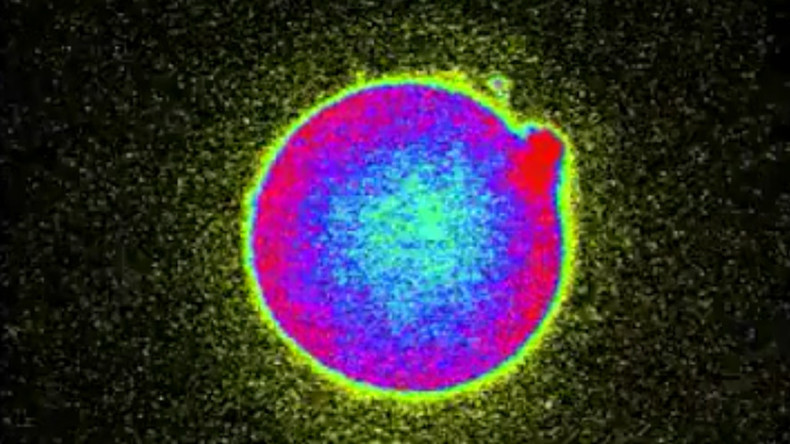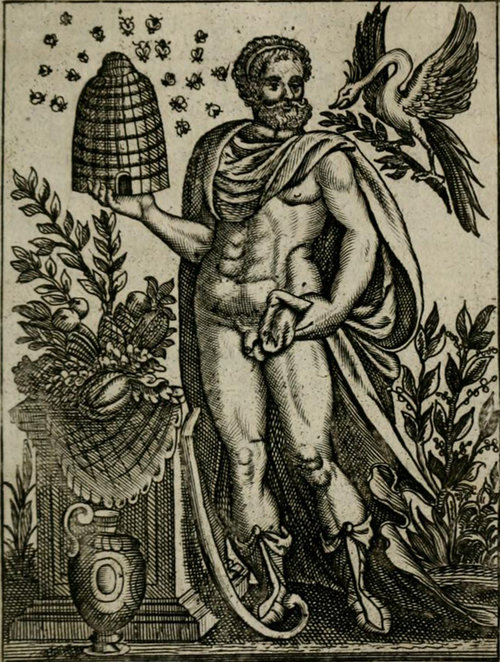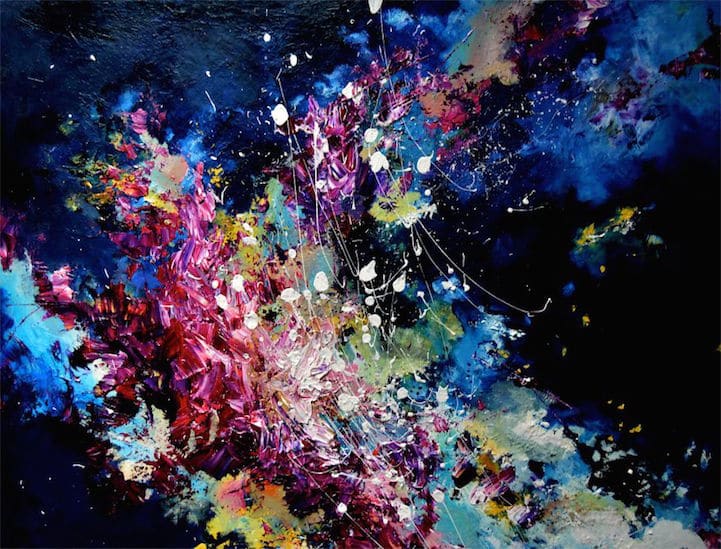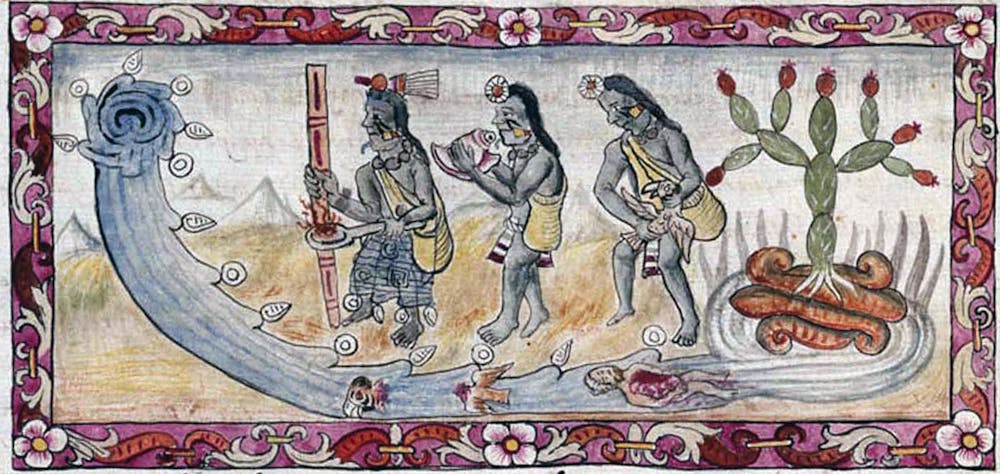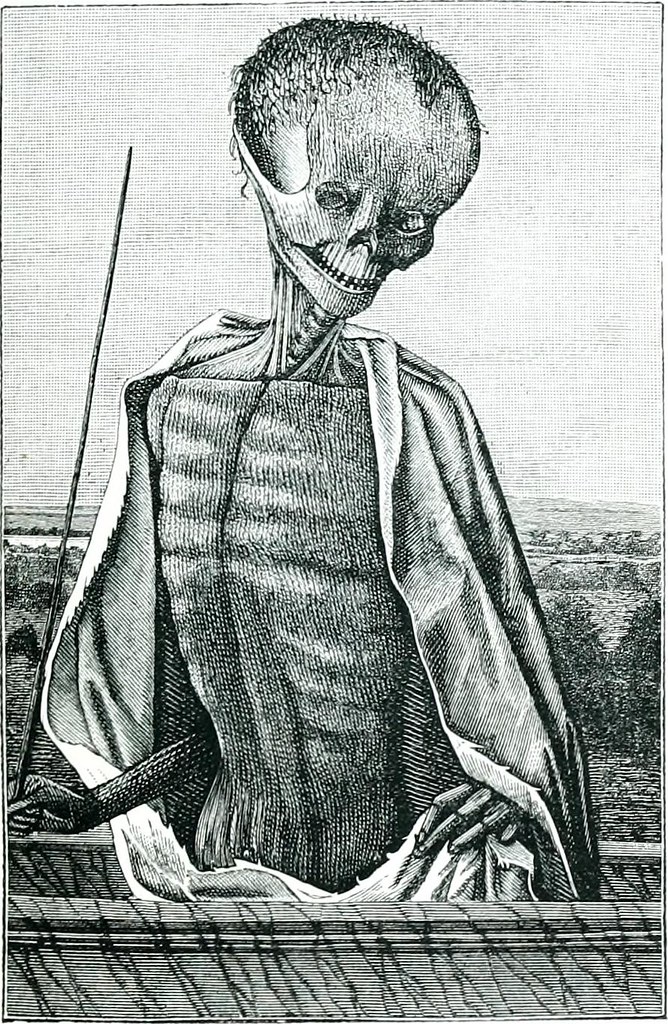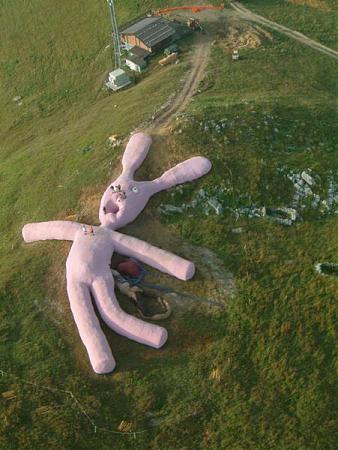Our dreams are a second life. I have never been able to penetrate without a shudder those ivory or horned gates which separate us from the invisible world. The first moments of sleep are an image of death; a hazy torpor grips our thoughts and it becomes impossible for us to determine the exact instant when the "I," under another form, continues the task of existence. Little by little a vague underground cavern grows lighter... The spirit world opens before us.
-- Aurélia, Gérard de Nerval

Gilles Deleuze, in particular, had his own early but
explicit
connections with the occult tradition, and this
influence,
although suppressed by himself and his followers, can be traced
throughout the entire trajectory of his work. In an article entitled
“The Sonambulist and the Hermaphrodite: Deleuze and Johann de
Montereggio and Occultism,” Christian Kerslake tracks down the beginning
of this esoteric career. Kerslake’s essay begins:
One
of Gilles Deleuze's first articles, published in 1946, was an
introduction to a new French edition of an arcane work of philosophy
bearing the title Mathesis: or Studies on the Anarchy and Hierarchy of Knowledge,
by one Dr Johann Malfatti de Montereggio. Deleuze was twenty-one when
he published his introduction to the French edition of Malfatti's Mathesis,
which was the first new edition for a hundred years. "Mathesis, Science
and Philosophy" is one of a group of five texts he published in the
period 1945-7, and which he subsequently repudiated and omitted from
French bibliographies of his work.
And the heavily occult nature of Malfatti’s book is absolutely evident:
In Anarchy and Hierarchy
it is as if [German Romantic philosopher] Schelling's final theosophy
comes to completion in a hallucinatory Tantrism, in which the living
body of God, in its most complete self-development, itself appears in
hermaphroditic form in human sexuality, where the
coming-to-divine-consciousness becomes identical to the psychosexual
attainment, along Tantric lines, of spiritual "bisexuality". This
"system", uncovered by Malfatti, is said to form the basis for all
subsequent Eastern and Western esoteric thought, and now furnishes us
with the long-lost key to the ultimate system of medicine.
Not only, according to Joshua Ramey in
The Hermetic Deleuze: Philosophy
and Spiritual Ordeal, did
Deleuze write about the occult. He also
attended a salon at the residence of Marie-Madeleine Davy, “
a scholar of
medieval philosophy and passionate spiritist,” in Paris where esoteric
ideas, among other radical subjects, were discussed by certain of the
glittering lights of French philosophy.
The
salons were the site of encounters between many leading French
intellectuals, such as Sartre and Bataille, as well as a very young
Gilles Deleuze.
The company also included a
number of French esotericists and devotees of occult philosophy, such as
Marcel Moré. Deleuze's work from this period reflects a profound
fascination with esoteric themes, inspired perhaps by Davy's own
conviction that a secret and subversive medieval tradition of
Neoplatonic thought contained a revolutionary gnosis waiting to be
rediscovered and redeployed in Europe.
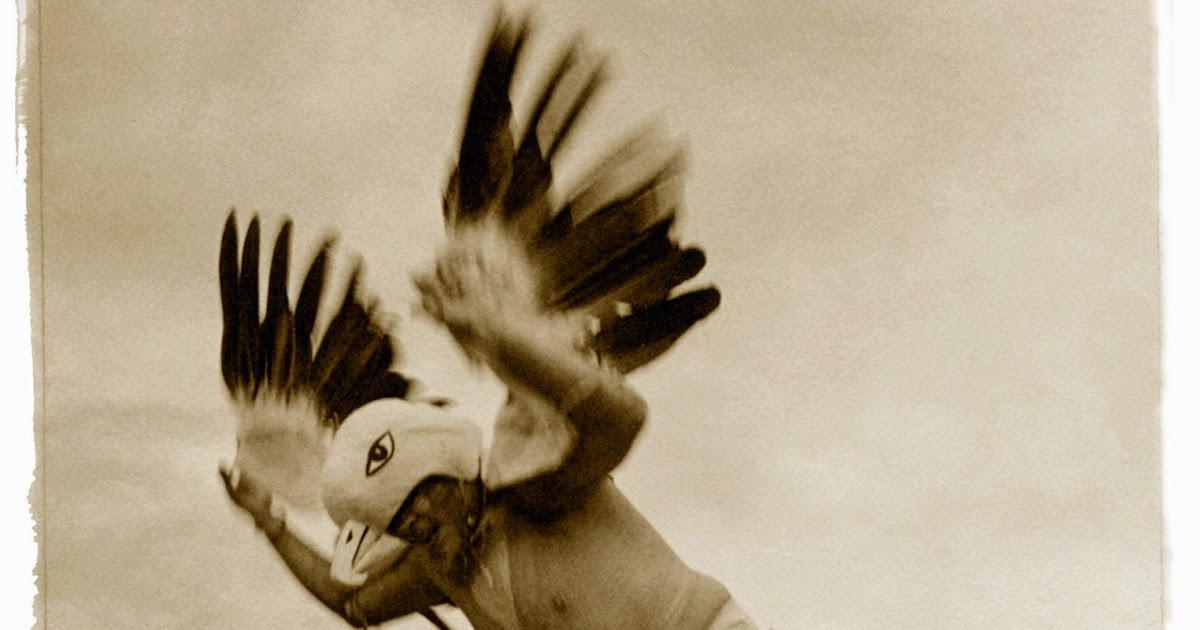
Scrambling and Rambling
Kerslake argues, in his later
Deleuze and the Unconscious, that well before such topics were quite openly explored
by D&G in the “Becoming Animal...” chapter/plateau (which Kerslake aptly calls “
a late modern occult treatise”), they were
present in Deleuze’s
Bergsonism. Kerslake quotes from near the close of
this text, which I’ll further condense here:
It
could be said that in man, and only in man, the actual becomes adequate
to the visual. It could be said that man is capable of rediscovering
all the levels, all the degrees of expansion (détente) and contraction
that coexist in the virtual Whole... Even in his dreams he rediscovers
or prepares matter. And durations that are inferior to him are still
internal to him... man is capable of scrambling the planes, of going
beyond his own plane as his own condition, in order finally to express
naturing Nature.
This power to retreat into the virtual and to "
scramble the planes" is
potentially active in all humans by apparent virtue of their being
human, but in practice it is only available to the sorcerer-shaman, to
the artist-poet, to the master dreamer. In short, it is available to
those who have passed beyond the first gate.
Here the powers to
transform, to become other, to dissolve or shatter the one into the
many, to vary the speeds of existence, to travel instantly in time and
space, to expand and shrink the boundaries of the self, to superimpose
one place and moment upon others, are all at hand.

The Master of Animals
is there to freely present them to anyone who possesses the key and who
knows the proper rites and intonations. The mystic, or more accurately
the sorcerer who is unbound to theology and priestly tradition, is a
singularity, a cosmic anarchist:
He
or she is an unnatural figure, who no longer conforms to the
established laws of nature (that is, the laws of established nature). (Deleuze and the Unconscious)
The controller of dreams, the artist/magician who comes to realize that
the portals to the astral extension are present everywhere, who
discovers that in fact there is no separation between the astral and the
physical for one who holds the silver key, soon realizes that the
“laws” of nature do not apply.
The planes
can be scrambled, the bounds
of the law can be endlessly stretched, forms can be altered, the only
imagined can be manifested in the light of day. Terence McKenna made
this exact realization in the confused and confusing wake of the
experiment at La Chorrera:
I
have come to believe that under certain conditions the manipulative
power of consciousness moves beyond the body and into the world. The
world then obeys the will of consciousness to the degree that the
inertia of pre-existing physical laws can be overcome. This inertia is
overcome by consciousness determining the outcome of the normally
random, micro-physical events. Over time the deflection of micro-events
from randomness is cumulative so that eventually the effects of such
deflections is to shift the course of events in larger physical systems
as well. Apparently, when wanting wishes to come true, patience is
everything. (True Hallucinations)
He goes on to explain that just as consciousness (in a way still unknown
to science) is able “
to direct the electrical flow in the central
nervous system” of our bodies, given greater awareness it appears that
electrons and atoms beyond our mere physical boundaries can likewise be
manipulated.

Within shamanic states of consciousness, in other words,
our personal boundaries -- the area within our willed control -- can be
enlarged, can encompass more and more of the “outside” environment. And
for McKenna, as in many shamanic and mystical traditions, the means by
which consciousness can expand in this manner is through
language.
The
sorcerer is revealed here as the original and ultimate
poet. The
influence of Lovecraft on McKenna is obvious here, as Terence readily
admitted and Dennis concurred by affirming that the McKennas’
Brotherhood of the Screaming Abyss, also the name of Dennis’
autobiographical record of life with his brother, was taken directly
from Lovecraft.
As in a Lovecraft story, the shaman-sorcerer descends to a space where
words fail, where the senses themselves must open and widen in order to
comprehend anything at all. In these spaces or states, the sorcerer must
discover the words to convey his or her experiences to the community,
in song or in writing or in other creative work, or risk insular madness
or even physical death.
The sorcerer, as Kerslake reading Deleuze
points out, is “
the only successful madman.” And there are many, mostly
unknown or forgotten or exiled, would-be sorcerers who have not
succeeded. The gate is easier to enter than it is to exit. Laws can
be stretched but often they do not contract to their usual and
comfortable limits.

Lovecraft’s horror stories are often about those who
fail to navigate the vast realm between the gates. And there are many
fates worse than physical death. Where many fail -- and especially many
moderns fail -- is in taking things too literally.
The Dissolving Borders of Self and Time
Hans Peter Duerr explains, in
Dreamtime, that
whatever the shaman experiences it is a mistake to say that he or she
objectively becomes an animal. Instead, it is more accurate to suggest that
the dichotomies of objectivity and subjectivity, outer and inner, break
down at this point.
What actually takes place is not that the shaman turns into an
animal, but rather that he has now experienced his "wild", his "animal
aspect". Not until that happens will he be a true shaman. For he cannot know his human side until he also becomes aware of what it is not. To put it differently, he needs to become estranged from it, to have seen it, that is, to have seen it from the outside.
After experiencing that, he is no longer what he once was. In pictorial
representations, he now appears as a human bird or a human with bird's
legs.
The successful animal-becoming, therefore, is a human-becoming. The
werewolves and the vampires are those who do not return, the damned. A similar thing
happens with the related phenomenon of magical flight. It would not be
possible to say that the sorcerer or the witch flies like a bird, at
least as we perceive bird-flight with our modern everyday consciousness,
but a type of flight
does occur.
It
not so much that we fly. What happens instead is that our ordinary "ego
boundaries" evaporate and so it is entirely possible that we suddenly encounter ourselves at places where our "everyday body", whose boundaries are no longer identical with our person, is not to be found.
The ego-defined boundaries of the self, which are identical to those
boundaries defined by our civilized culture, are at least temporarily
erased. The individual psyche and the collective psyche, known in the
past as the World Soul, temporarily become once again undivided.

And
this extension of the Earth, this astral plane, this psychic realm
between the material and the spiritual, between the gates, is precisely
the World Soul. The sudden erasure of boundaries can be experienced --
can be
known -- as magical flight, as animal becoming, as telepathy or
telekinesis, as sexual and mystic ecstasy.
...a brujo need
not be able to fly like a bird in order to arrive at a different place
within seconds, for it seems that a sorcerer can change the boundaries
of his person so much that he can be simultaneously within his everyday
body and also at another place, where his body is not. Something
like that may indeed be happening during divination and telepathy, for
the people involved do not seem to overcome distances the way
electromagnetic waves do. It does not appear to be a transmission as
assumed by most parapsychologists. We are apparently dealing more with a
"lifting of boundaries", in which there is a dissolution of barriers
developed during the processes of civilization and individuation.
Yet it is not only the boundaries of the self that lift. Throughout
history and in many lands, those individuals and groups who have passed
beyond the first gate have entered into the timeless. Or, in other
words, beyond this point time is no longer experienced as mere duration, measured by clocks or the sun,
but is identified with
eternity.

Across the world this breach into
eternity has been celebrated with processions and parades, with mad dance, with the
shattering of taboos, with the overturning of authority and the
inversion of social roles, with the expenditure and destruction of
property, with inebriation, with unbridled festivity, and with a riot of the
senses.
And, very understandably, it is the marginalized, the
oppressed, the outcasts and
freeks who were mostly likely to jump into
the fray, to stomp most wildly in the thick of the hairy ruckus.
It
is easy to see how these "good witches", and also the werewolves or the
wild women of the Nomkubulwana, are related to those "great throngs of
women" who raged through the quiet of the night, the Couroi of Crete,
who danced over the meadows in the retinue of the Great Goddess, the
enraptured skin-clad maenads of the "Great Transformer", the nocturnal
hordes of the spirits of the dead of Artemis-Hecate, and the mad
"Bechler" women of the Slovenian Gail valley.
Witches, werewolves, maenads, spirits of the dead, the mad. With these
as the denizens of the midnight romps -- as in the cult of Cthulhu itself
-- it is easy to see how the existing authorities in the ancient and
medieval periods, and in “respectable” society in general, would attempt to
suppress or at least contain and rechannel these outbursts of truly
subversive energy. Festivals were therefore (mostly) permitted as useful
releases of steam, as acceptable (though temporary) penetrations of the
eternal.
No matter how
great the differences between these groups of people, they were all
united by the common theme that "outside of time" they lost their normal
everyday aspect and became beings of the "outer" reality, of the
beyond, whether they turned into animals or hybrid creatures or whether
they reversed their social roles. They might roam bodily through the
land or only "in spirit", in ecstasy, with or without hallucinogenic
drugs.
Mystery is for the Immature
With the onset of modernity, however, as more and more aspects of life
became colonized by the state and its micromanagement of the everyday,
the boundaries between time and eternity, between the real and the
imaginal, between the civilized and the wild, became thickened and more
rigid. The gates became harder and harder to find, and when they were
found and passed through there were fewer and fewer guides to point the
way home.

With the wilderness being increasingly cleared, with the
territory being mapped and over-mapped, with the monitoring and coding
and stratification of everything, what was once “outside” retreated to
the “inside.” Communal ecstasies and potlatches became something inward and
alienated, branded as sickness, antisocial. Psychiatrists became the
police of the psyche.
Unfortunately,
it happens many times that psychiatrists of this sort are people who
equate the boundaries drawn by modern civilization between itself and
the wilderness with a dividing line between reality and illusion. As far
as they are concerned, the reaches beyond that border are mere
"projections", and the dissolution of the boundary indicates mental
illness.
The boundaries of the consensus, of the narrow spectrum of thought
accepted by civilization, are identical to the boundaries of the real.
Everything outside of these bounds/binds is nonsense, insanity,
unhealthy, impure. Yet for those still blessed or cursed by dreams and visions
of landscapes and beings beyond the borders, nothing within them
will ever wholly satisfy.
Randolph Carter -- and likely Lovecraft, too,
despite his materialist claims -- was one of these few, and in
The
Silver Key his melancholic disgust of the consensus is explained:
They
had chained him down to things that are, and had then explained the
workings of those things till mystery had gone out of the world. When he
complained, and longed to escape into twilight realms where magic
moulded all the little vivid fragments and prized associations of his
mind into vistas of breathless expectancy and unquenchable delight, they
turned him instead toward the new-found prodigies of science, bidding
him find wonder in the atom’s vortex and mystery in the sky’s
dimensions. And when he had failed to find these boons in things whose
laws are known and measurable, they told him he lacked imagination, and
was immature because he preferred dream-illusions to the illusions of
our physical creation.
The illusions of the physical are the only accepted illusions. Fantasy
can be explored in art, but only if this art is self-conscious of its
separation from the real and confines itself within the authorized mores
and tastes of society. All else is dismissed as romantic, foolish and/or
destructive escapism. Even children, increasingly, are denied to right
to imagine.

The eternal may have burst through in the past, or perhaps
will do so in the far distant future (but, the consensus bleats on, such
an event is very improbable as “natural laws” would be violated), but
it will not arrive today. The laws have been fixed. The gates are closed
and the keys have been lost.
No Place In Waking Life
All this indicates, even in the case of normally perceptive
scholars like Mircea Eliade, a total misunderstanding of where and when
this “dreamtime” is situated. As Duerr explains (quoting Eliade and
anthroplogists and psychoanalysts who hold a similar misconception):
The concept of "dreamtime" does not refer to any time in the distant past
to which the Australians supposedly think they can be "called up",
"repeated" or "emulated", which "endures" or proceeds "parallel" to
ordinary time, or which could be "projected" upon the present. The
"dreamtime" is not past, present or future time: it has no "location"
whatever on the continuum of time.
It, the extension, the astral, the dreamtime, the realm of becoming, the
World Soul, does not fall within time. It is both fully absent and,
potentially, fully present. It is both underworld and off-world, in the
unconscious and in super-consciousness. It “occupies” the space between
the rigid categories and typologies of our defined and preassigned
reality.
Kenneth Grant, in
The Magical Revival, explains that this is also the
space of Lovecraft’s writing:
H.P.
Lovecraft, in one of his tales of terror, alludes to certain entities
which have their being "not in the spaces known to us, but between them. They walk calm and primal, of no dimensions, and to us unseen."

This was also the space that the McKenna brothers, by turning their organic
keys, blasted their way into in March of 1971. And in very similar
language to that used to describe what Carter beheld after stepping through the
first gate (“
It is full of those paradoxes, contradictions, and
anomalies which have no place in waking life..”), Terence struggles to
make sense of what they had witnessed:
Our
collective intelligence was not compromised, but what was compromised
was the ability of reason to give a coherent account of what was going
on, as paradox, coincidence, and general synchronistic strangeness began
to increase exponentially. Into the vacuum left by the collapse of
reason rushed a staggering array of exotic intuitions about why things
were as they were.
Terence McKenna’s thought gets unfortunately pegged to his prediction of
the singularity or
concrescence that would occur on December 21st of
2012. When this event failed to happen in an obvious and spectacular way (although I think
the jury is
still out on whether something
did begin to ripple into
manifestation at that time) his wider perspective has been largely
neglected.

The origins of 2012, though, were at La Chorrera. 2012, in a
very real sense, already took place then and there, and the date
essentially has become a symbol -- much like the Incarnation of Christ
-- of a singular event that could potentially happen at any “point”
within or between the space-time continuum.
Werewolves Become Vampires When They
Die
And there is the feeling,
reading these authors, that the space of the extension is really
coterminous with the world itself. Borrowing the terms of
A Thousand
Plateaus, the becomings that characterize the entire plane of consistency
also move between the
strata of the fixed and ordered. The plane of
consistency -- as well as all of the synonyms that D&G suggest for it,
including the Mechanosphere -- is yet another expression for the World
Soul.
Furthermore, if we
consider the plane of consistency we note that the most disparate of
things and signs move upon it: a semiotic fragment rubs shoulders with a
chemical interaction, an electron crashes into a language, a black hole
captures a genetic message, a crystallization produces a passion, the
wasp and the orchid cross a letter...
The
plane of consistency knows nothing of differences in level, orders of
magnitude, or distances. It knows nothing of the difference between the
artificial and the natural. It knows nothing of the distinction between
contents and expressions, or that between forms and formed substances; these things exist only by means of and in relation to the strata.
All of this at once reflects and is reflected by the various becomings
participated in by the sorcerer roaming in the wild:
Thus
packs, or multiplicities, continually transform themselves into each
other, cross over into each other. Werewolves become vampires when they
die. This is not surprising, since becoming and multiplicity are the
same thing... the Wolf-Man's pack of wolves also becomes a swarm of
bees, and a field of anuses, and a collection of small holes and tiny
ulcerations (the theme of contagion): all these heterogeneous elements
compose "the" multiplicity of symbiosis and becoming.

The world of the sorcerer, then, is precisely the physical world
apprehended through a wider range of perception, perception that has not
been blocked or limited by the various strata. The world is not wholly
transformed beyond the first gate, but our sense of it
is entirely
changed. A new, in-between, realm opens up, one that has always been
there but has been little noticed. Henri Corbin, the French Islamic
scholar,
locates this same understanding within esoteric Islam:
We
observe immediately that we are no longer reduced to the dilemma of
thought and extension, to the schema of a cosmology and a gnoseology
limited to the empirical world and the world of abstract understanding.
Between the two is placed an intermediate world, which our authors
designate as ‘alam al-mithal, the world of the Image, mundus imaginalis:
a world as ontologically real as the world of the senses and the world
of the intellect, a world that requires a faculty of perception
belonging to it, a faculty that is a cognitive function, a noetic value, as fully real as the faculties of sensory perception or intellectual intuition.
This
faculty is the imaginative power, the one we must avoid confusing with
the imagination that modern man identifies with “fantasy” and that,
according to him, produces only the “imaginary.” Here we are, then,
simultaneously at the heart of our research and of our problem of
terminology.
Yet another synonym is introduced, then, with Corbin: the
mundus
imaginalis. This, being a “realm” between the empirical and the abstract
or spiritual, exactly describes the World Soul and Corbin explicitly
makes this identity. Corbin also provides the key to enter this
threshold realm: the imagination or the “
imaginal.” And with this we are
right back at the start. “
To think is always to follow the witch’s
flight,” as Deleuze put it in
What is Philosophy?
Playing the Games of Satan
But words of caution are required. The astral or psychic realm that we’ve
entered into past the first gate is not the highest realm of the spirit.
Instead, it is a confusing place, a wonderful but often terrifying
place, a place full of angels and devils and all sorts of elementals,
nymphs, sprites and kobolds. It is very easy to get lost here forever.

The Traditionalist, René Guénon, who like Corbin became enamoured by
esoteric Islam, writes of the fatal confusion between the psychic and
the spiritual in his masterwork,
The Reign of Quantity and the Sign of
the Times:
This
confusion moreover appears in two contrary forms: in the first, the
spiritual is brought down to the level of the psychic, and this is what
happens more particularly in the kind of psychological explanations
already referred to; in the second, the psychic is on the other hand
mistaken for the spiritual; of this the most popular example is
spiritualism, but the other more complex forms of “neo-spiritualism” all
proceed from the very same error.
And this error is especially evident within shamanism, especially modern
interpretations of “shamanism,” and its power-obsessed shadow,
sorcery.
The
magical part of "shamanism" doubtless has a vitality of quite a
different order, and that is why it is something really to be feared in
more than one respect; for the practically constant contact with
inferior psychic forces is as dangerous as could be, first for the
"shaman" himself, as is to be expected, but also from another point of
view of a much less narrowly "localized" interest.
Guénon approaches this with the utmost seriousness and warns, almost
curses, those who would lead others down this false path:
It
is all too easy to see the gravity of the consequences of any such
state of affairs: anyone who propagates this confusion, whether
intentionally or otherwise and especially under present conditions, is
setting beings on the road to getting irremediably lost in the chaos of
the "intermediary world", and thereby, though often unconsciously,
playing the game of the "satanic" forces that rule over what has been
called the "counter-initiation".
The warning is stark and sobering. Nearly all of the figures mentioned
in these essays -- Lovecraft, McKenna, Deleuze and Guattari, Grant,
Duerr, etc. -- could be accused of propagating confusion according to Guénon’s
strict assessment.
All of the above are explorers of the “
intermediary
world" and several, Grant certainly and possibly Deleuze and Lovecraft,
are associated with occult orders such as the Hermetic Order of the
Golden Dawn, etc.
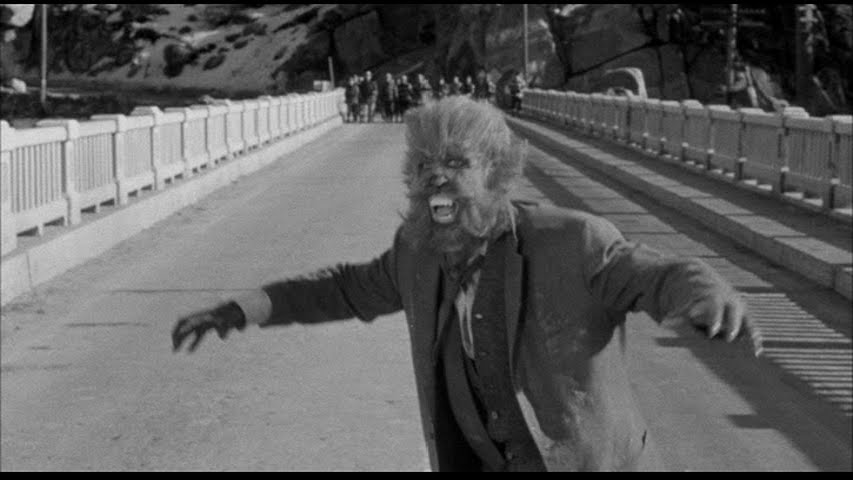
These orders -- groups incidentally that Guénon was
also once an initiate of -- would be accused by Guénon and other
Traditionalists as being instruments of the “
pseudo-initiation” or even the more openly subversive
“
counter-initiation.” So how would the authors above defend themselves
against this damning criticism? Are they really Satanists?
In the case of Deleuze and Guattari, -- despite their fervent talk of the
demonic, of animal-becomings, of unnatural participations and nuptials,
and of scrambling the planes and flying with the witches -- their own
warning echoes throughout
A Thousand Plateaus. It is perhaps most clearly
expressed in the final plateau:
Every
undertaking of destratification (for example, going beyond the
organism, plunging into a becoming) must therefore observe concrete
rules of extreme caution: a too-sudden destratification may be suicidal,
or turn cancerous. In other words, it will sometimes end in chaos, the
void and destruction, and sometimes lock us back into the strata, which
become more rigid still, losing their degrees of diversity,
differentiation, and mobility.
All of this is playing with fire, dancing with chaos. And the other
authors above all have their own warnings and cautions. But do these
excuse them from Guénon’s curse? Maybe not. Maybe they are all agents of
the counter-initiation and/or its more prosaic sub-organizations. This has
certainly been
suggested widely of Terence McKenna in quite recent years.

But, beyond the
first gate, which our whole culture may be stepping through, who does
not escape suspicion? We are all transforming, churning, splitting,
melding, becoming. The Traditionists vs. the Perennialists vs. the Neo-Traditionalists. Guénon in the 1940s cautioned that there were no authentic and traditional orders of initiation remaining in the West. Could this also be true of the East today? And how would we know one way or the other?
The Traditionalists of the present may be as confused, as implicated,
as anyone else. Maybe they are also playing into an agenda that would prevent any rigorous exploration, any
unsanctioned expression, of the imagination at all? Or is this my own
satanic confusion and paranoia? The
mundus imaginalis encompasses all of this.
To the Immediate
But
there still is hope of escape that does not lead back to the merely
material. The second gate! None of these authors stay anchored in the
astral. ‘Umr at-Tawil, the Master of Animals, leads us forward through
the shifting confusion and onward towards the ultimate gate beyond which
“
all dimensions dissolve in the absolute.” We still hold the silver
key. Hyper-carbolation marches forth.
“I
am indeed that Most Ancient One,” said the Guide, “of whom you know. We
have awaited you—the Ancient Ones and I. You are welcome, even though
long delayed. You have the Key, and have unlocked the First Gate. Now
the Ultimate Gate is ready for your trial. If you fear, you need not
advance. You may still go back unharmed the way you came. But if you
choose to advance...”







